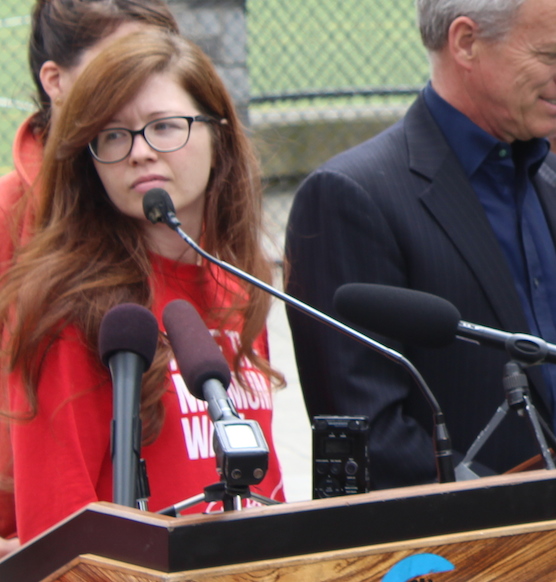Aclimate scientist specializing in paleoceanography, Jess Spear was one of the chief organizers of Kshama Sawant’s victorious socialist City Council campaign and the subsequent 15Now campaign, which resulted in the new $15 minimum wage recently signed into law by Mayor Murray. Then last month, she announced that she is running against Speaker of the House Frank Chopp for the 43rd District seat of the State House. Naturally, we had some questions.
Seattle Weekly: How did you get into politics?
Jess Spear: Like a lot of young people, I saw things wrong with the world that didn’t seem too hard to fix. But when you are young, you’re called an idealist. People say “This is the way the world works.” And a lot of young people are sort of beaten down by hearing that from older people, but I never accepted that.
When I was in college I picked up a book by Carl Sagan called Billions and Billions, and in there was an essay on global warming that was a real call to action for me. I decided I was going to go to graduate school [at the University of South Florida] and get a degree in climate science.
The more you learn about what’s happening, the more radical one becomes. Year after year, there’s more and more data showing that past predictions are quite conservative, and that what’s coming is coming faster than we expected it to. As a paleoceanographer [for the U.S. Geological Survey and Burke Museum], I thought, “My research is adding to the body of knowledge, but is this really enough? I keep generating all this data, but if that’s not really showing policy-makers what’s necessary to stop this, then what do we do?”
You mentioned solar roadways in your campaign announcement speech—is that the main green-energy infrastructure project you would put on the docket if you were elected?
No, I mentioned solar roadways in that it’s a new technology, and there’s new technology coming out all the time. I talked about solar roadways in that that’s an amazing new invention I’d just heard of that could be implemented. But we don’t need new technology like that to move to 100 percent renewable energy in Washington. We already have the technology. Why don’t we have solar panels everywhere? Why don’t we have more windmills in eastern Washington? Why aren’t we moving toward that? That technology is being held back, and we should ask ourselves “Why?”
There are two things holding it back:
1) Nobody on a policy level is advocating for these things. We can’t just stop pipelines. We can’t just stop coal terminals. What are we doing to move forward?
2) The capitalist system we live under is centered around the production of what makes the most money, not “What products do humans need, and how can we make those in an environmentally sustainable way?” Thinking about that in terms of climate change—fossil-fuel infrastructure has had billions invested into it, and it creates billions in profits. So in the logic of the system itself, there’s really nothing to incentivize them to go any other direction. The new regulations just announced by the Obama administration are a step in the right direction, but they are a baby step considering what we need.
People were so excited about Obama’s carbon-emissions cap because the president simply did
something
about the issue. It’s funny seeing that from Washington state, where we have this reputation as being a leader in the climate-change issue. Inslee is rated one of the greenest governors we have—
[quiet laughter]
See, you’re laughing. It’s true, though—it seems like we as a state could be doing a lot more.
This supposedly “greenest governor ever” is calling for a panel of people to come together for “market solutions,” which is code for “incentivizing business to do what’s right.” We need to advocate for and organize around really bold advances in renewable energy.
The biggest global model for that right now seems to be Germany. Have you looked at their model for that?
Yes! They decided to shut down their nuclear reactors in the wake of Fukushima, and needed to replace that energy production, so they really ramped up their solar production. They were quickly able to reach an excess of required energy for the country. How quickly did it take to get that done? Just a few years. [But] the German model is not something we should follow in terms of how to fund renewable-energy expansion. Working people should not have to pay for this through increases in electricity rates or through taxes. The wealthy corporations and super-wealthy individuals must be taxed to pay for it. Just closing the tax loopholes in Washington state would generate about $6 billion a year in extra revenue.
What would you say to people who criticize your lack of “political chops,” if you will, especially against a 20-year political veteran like Frank Chopp?
Yes—I lack experience in giving Boeing $8 billion handouts, and sitting in rooms with corporations and working out how we can smooth out a deal where they get to pay nothing, and derail regulations on our environment. What I have is a proven track record in organizing ordinary people to get involved in the political process, and really pressure elected officials to do what’s best for them and the environment that sustains our society. I helped elect the first socialist City Council member in 100 years, and six months later we got a $15 minimum wage, a campaign I also helped organize.
When you envision Seattle decades in the future, what does it look like to you?
It’s 100 percent renewable. It’s a walkable city. It’s a city with mass transit that’s free for everybody. It’s a city where we don’t have to pay for electricity because it’s just generated all around us.
ksears@seattleweekly.com








